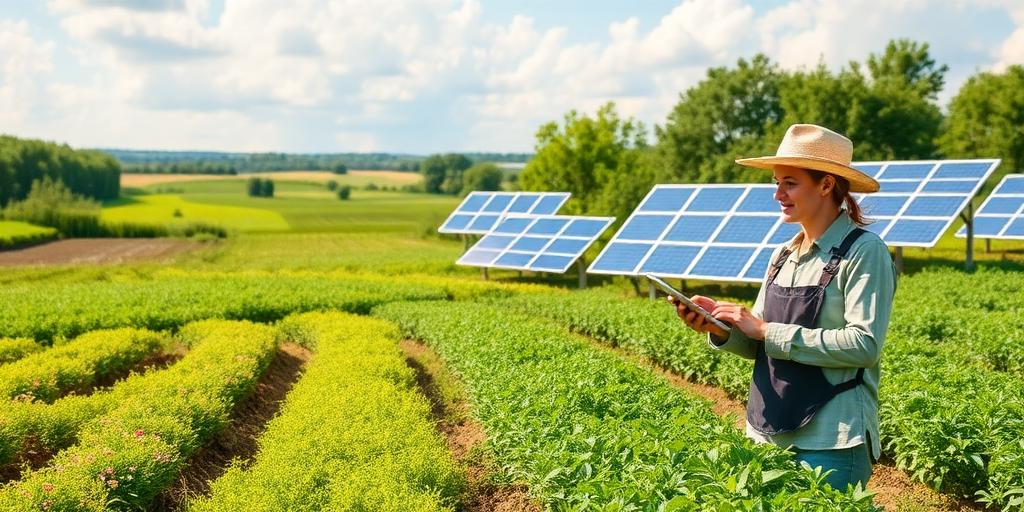The Science Behind Sustainable Agriculture
Sustainable agriculture is more than just a buzzword; it's a comprehensive approach to farming that focuses on producing food and fiber in a way that protects the environment, public health, and the long-term productivity of natural resources. It integrates scientific principles with traditional farming practices to create systems that are economically viable, environmentally sound, and socially responsible.
What is Sustainable Agriculture?
At its core, sustainable agriculture aims to minimize the negative impacts of farming on the environment while ensuring food security. This involves reducing the use of synthetic inputs, conserving water, promoting biodiversity, and improving soil health. The goal is to create a balanced ecosystem within the farm that can support long-term productivity.
Key Principles of Sustainable Agriculture
Soil Health: Healthy soil is the foundation of sustainable agriculture. Practices such as crop rotation, cover cropping, and no-till farming help to improve soil structure, increase organic matter, and enhance water infiltration. These practices reduce erosion, improve nutrient cycling, and sequester carbon, contributing to climate change mitigation.
Water Conservation: Efficient water management is crucial in sustainable agriculture. Techniques like drip irrigation, rainwater harvesting, and water-efficient crops help to conserve water and reduce water waste. Additionally, maintaining soil health improves water infiltration and retention, further reducing the need for irrigation.
Integrated Pest Management (IPM): IPM focuses on minimizing the use of synthetic pesticides by using a combination of biological, cultural, and mechanical pest control methods. This includes introducing beneficial insects, using crop rotation to disrupt pest cycles, and employing physical barriers to protect crops. IPM reduces pesticide residues in food and minimizes the impact on non-target organisms.
Biodiversity: Promoting biodiversity within and around the farm is essential for ecosystem health. Planting diverse crops, maintaining hedgerows and buffer zones, and creating habitats for pollinators and beneficial insects can enhance ecosystem services such as pollination, pest control, and nutrient cycling. Biodiversity also increases the resilience of the farm to environmental stresses.
Nutrient Management: Sustainable nutrient management involves optimizing the use of fertilizers to minimize nutrient losses and environmental pollution. This includes using organic fertilizers such as compost and manure, applying fertilizers based on soil testing and crop needs, and implementing practices to reduce nutrient runoff and leaching. Efficient nutrient management improves crop yields while protecting water quality.
Scientific Innovations in Sustainable Agriculture
Precision Agriculture: Precision agriculture uses technology such as GPS, sensors, and data analytics to optimize inputs and management practices. This allows farmers to tailor fertilizer and pesticide applications to specific areas of the field, reducing waste and minimizing environmental impacts. Precision agriculture also enables farmers to monitor crop health and make informed decisions in real-time.
Biotechnology: Biotechnology offers tools to improve crop traits and enhance sustainability. Genetically modified (GM) crops can be engineered to resist pests, tolerate herbicides, and improve nutrient use efficiency. However, the use of GM crops is a subject of debate, and careful risk assessment and regulation are necessary to ensure their safe and responsible use.
Agroecology: Agroecology combines ecological principles with agricultural practices to design sustainable farming systems. It emphasizes the integration of crops, livestock, and trees to create diversified and resilient ecosystems. Agroecology also promotes social and economic equity by supporting local food systems and empowering farmers.
Challenges and Opportunities
While sustainable agriculture offers numerous benefits, it also faces challenges such as higher initial costs, the need for specialized knowledge, and the lack of market access for sustainably produced products. However, there are also significant opportunities to overcome these challenges through research, education, policy support, and market development.
The Future of Farming
Sustainable agriculture is not just a trend but a necessary shift towards a more resilient and equitable food system. By embracing scientific principles and innovative technologies, farmers can produce food in a way that protects the environment, supports rural communities, and ensures food security for future generations. As consumers become more aware of the environmental and social impacts of their food choices, the demand for sustainably produced products will continue to grow, driving the adoption of sustainable agriculture practices worldwide.









